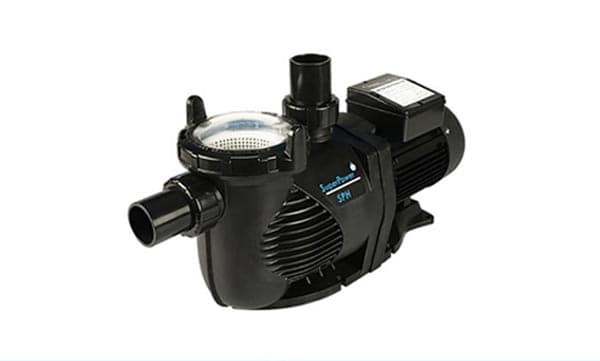The filtration pump holds a special significance in the structure of swimming pools, as its absence can lead to water contamination, posing risks to swimmers’ health. In this article, we delve into the examination of pool filtration pumps, their equipment, and maintenance principles, providing useful insights in this regard.
Application of Filtration Pumps for Pools:
Maintaining clean pool water is crucial, whether you own a personal pool or manage recreational and sports pools. Stagnant waters provide an ideal breeding ground for various fungi and algae. In pools, without water circulation, they can quickly become hazardous to swimmers. This issue can be easily controlled by circulating water in the pool, but how can pool water be circulated and purified?
Filtration pumps for pools are an excellent solution to this problem. A pool filtration pump is among the essential equipment that must be installed in every pool. By creating suction, the pool pump transfers pool water to the filtration filters for purification. However, the crucial point is that the pool pump must be of good quality and performance; otherwise, water contamination will spread, turning pools into hazardous environments.
Try to pay attention to necessary details when purchasing pool equipment, and avoid purchasing from various centers for pool, sauna, and jacuzzi supplies.
What is a Pool Filtration Pump?
You’re probably familiar with the fact that if stagnant water remains in one place for a long time, it will undoubtedly become contaminated. Pool waters are also stagnant and are categorized as stagnant waters. To solve this problem, a proper and systematic solution must be sought, and the only solution to this problem is circulating and purifying pool water, which is why pool filtration pumps are used.
The filtration pump moves water through the skimmers and drains towards the filtration filters. The pool pump, along with the filtration filter, is responsible for cleaning the pool of any impurities. These two together can accomplish this task, and individually, they practically serve no purpose.
Components of Pool Filtration Pumps:
Pool filtration pumps are composed of various components to fulfill their primary purpose of keeping the pool clean. Pool filtration pumps have similar shapes and parts, with differences in appearance details, water output size, and pumping power.
In the past, pool pumps were made of bronze, which was very durable but also heavy and expensive. However, nowadays, pump components are encapsulated in fiberglass and polypropylene housings, which are much lighter than older models and have high resistance to chemical corrosion, such as chlorine.
The main components of various pool filtration pumps include:
- Motor: It pumps water into the pump.
- Basket strainer or skimmer: Coarse particles are separated from the water by the basket strainer or skimmer.
- Impeller: After passing through the strainer, water is pushed towards the filtration filters by the impeller.
Types of Pool Filtration Pumps in terms of Speed:
If we categorize pool pumps based on speed, the classification includes: Single-speed pool pump: This type of pool pump operates at a specific speed in a particular cycle. In other words, its electric motor rotates at a constant speed. These pumps were widely used in the past, but their use is not common today.
Dual-speed pool pump: Another type of pool pump is known as the dual-speed or two-speed pool pump. It operates at two speeds, high speed and low speed, depending on the consumer’s needs. This itself reduces electricity consumption. This model requires much more power to provide the required flow rate for the pool compared to the single-speed model.
Variable-speed pool pump: These types of pool pumps have variable speeds and are used in advanced and equipped pools. They are made by many reputable brands. Variable-speed pool pumps have much higher durability and efficiency and produce less noise. However, in terms of price, they are much more expensive than the previous two types.
The Most Important Tasks of Pool Filtration Pumps:
Pool pumps are among the most critical parts of the pool water purification system and are, in fact, considered its heart. The functioning of a swimming pool is entirely dependent on the pool filtration pump. Below are the most important tasks of the pump:
- Circulating water for purification and cleaning
- Preventing the entry of any suspended matter and impurities into the water
- Preventing water stagnation inside the pool
- Preventing mud buildup on the pool floor and walls
- Compensating for water pressure drop in the purification process
How Does a Pool Filtration Pump Work?
Water enters the pump through suction and then passes through the basket strainer to remove large objects such as tree branches and coarse particles. Passing through the strainer prevents the entry of large objects and coarse particles that may damage the impeller. After the primary filter, the water enters the filtration filters, which remove very fine particles. Then the purified water is transferred to the water heater to reach the appropriate temperature. Before the heated water enters the pool, an appropriate amount of chlorine will be added to it. This process causes water to flow into the pool.
Duration of Pool Pump Operation:
Even if pool pumps are continuously running, it’s better to give them a break during the day. This rest increases their lifespan and improves their performance. The best time to use the pump is during peak electricity consumption hours, which is from 6 PM to 11 PM. For residential and villa pools, it’s best to run the pump for 4 to 5 hours a day.

